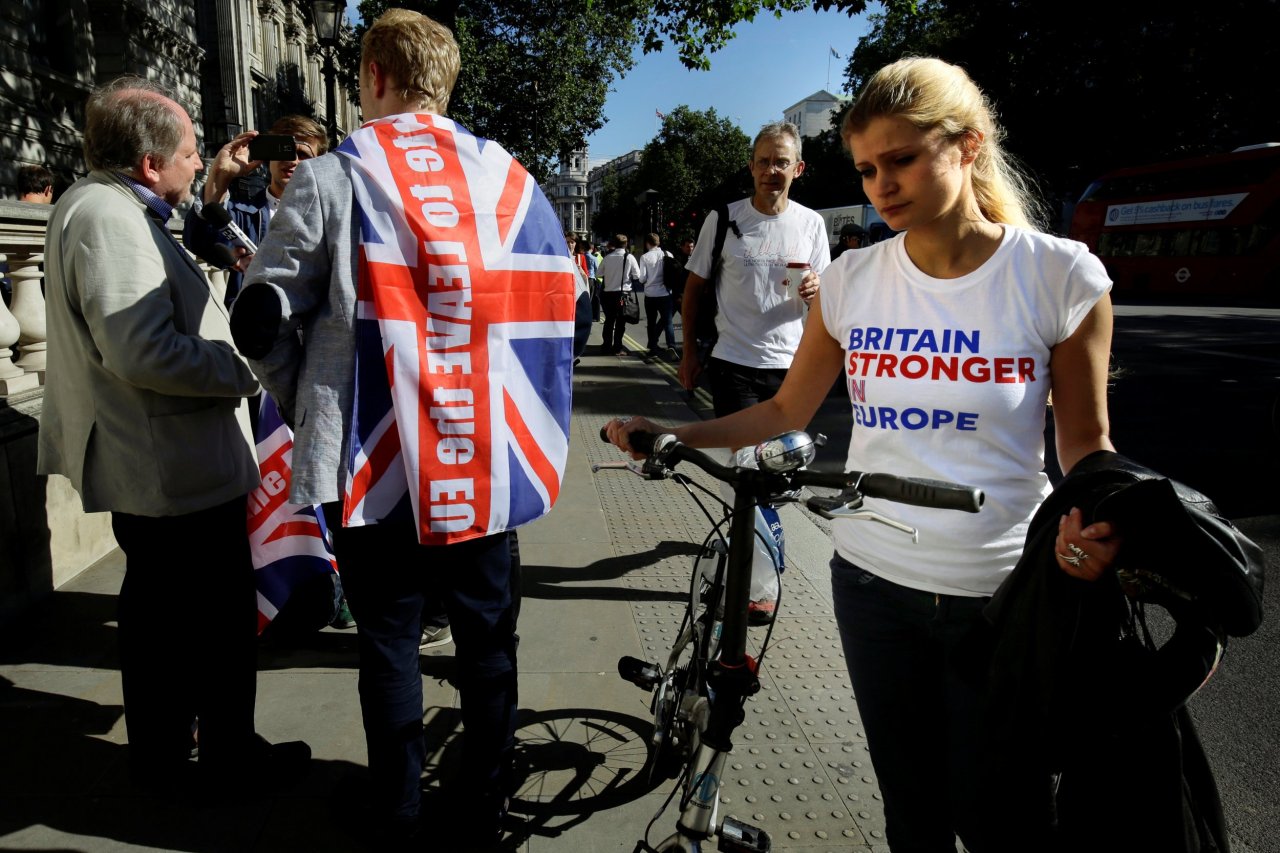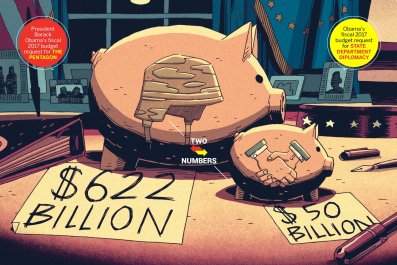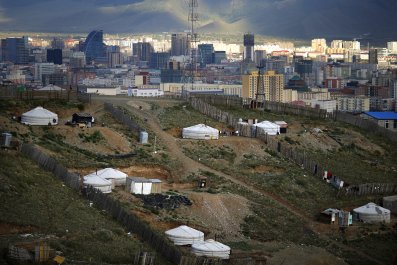Britain's Brexit vote was a victory of the old over the young, of the less educated over the educated, of nationalism over internationalism. No wonder the presumed U.S. Republican presidential nominee, Donald Trump—who happened to be visiting one of his golf courses in Scotland when the result was announced on June 24—was delighted. Polls show that both Brexit voters and Trump's grassroots supporters are motivated by a similar mix of fear and fantasy: a yearning to control immigration, reverse globalization and restore national greatness by disengaging from the wide, threatening world.
"People want to take their country back," said Trump as news of the vote broke. "They want to have independence…all over Europe, they want to take their borders back."
Trump is right: The Brexit vote is just the latest and clearest manifestation of the populism and nativism that's uniting the have-nots of Europe and America against the political establishment. The first victim of this political primal scream from the disenfranchised is likely to be the United Kingdom itself. In the wake of the Brexit vote, Scotland's first minister, Nicola Sturgeon, announced that a new referendum on independence was "highly likely" after Scottish voters resoundingly backed remaining in Europe. Sturgeon said she would not stand for Scotland "being taken out of the EU against its will." Northern Ireland's deputy first minister, Martin McGuinness, called for a vote on reuniting with the Republic of Ireland, calling it "the next logical step…for all of us who believe in the EU and want to remain part of Europe."
London, home to over a million European migrants and Britain's economic powerhouse, is also pushing back. London's new mayor, Sadiq Khan, called for the city to have "a voice at the table" during the U.K.'s renegotiations with Europe—and within hours of the result over a hundred thousand people had signed an online petition calling for London to declare independence from the rest of the country.
"There are times, not very often, when you can feel history being made," wrote historian Dominic Sandbrook in the fervently pro-Brexit Daily Mail newspaper. "An archduke falls, a wall comes down, a plane hits a building, and in that moment you can feel the ground shifting beneath your feet."
And it not just British ground Sandbrook feels shifting. It's all of Europe. The European Union has been the boldest political experiment of modern times—one that helped bring peace and prosperity to a fractious and divided continent. As recently as the 1970s, Spain, Portugal and Greece were ruled by fascist dictators or military juntas, and until 1989 all of Eastern Europe was effectively under Soviet military occupation. The EU has absorbed most of those countries; many of those still on the outside want in. And yet, at the same time, the EU finds itself under sustained attack from within.
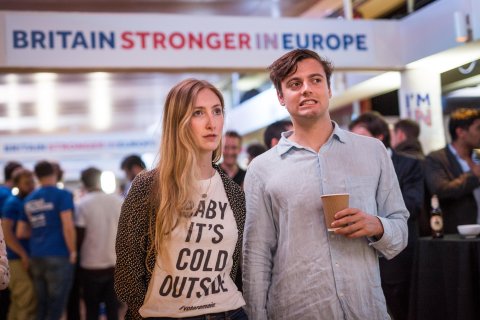
Swaths of voters across the union have begun clamoring to leave not just the EU but—in the case of Scotland, Spain's Catalonia and Belgium's Flanders—their own countries. In France, National Front leader Marine Le Pen hailed the vote as a "victory for freedom.… I've been saying for years that we must now have the same referendum in France and other EU countries." Dutch anti-immigration politician Geert Wilders said it was time for a Netherlands Nexit vote, while Matteo Salvini, the leader of Italy's Northern League, tweeted that "heart, brain and pride defeated lies, threats and blackmail. THANK YOU UK, now it's our turn." The anti-immigration Sweden Democrats declared that they were "waiting for Swexit!" while Beatrix von Storch of Germany's Eurosceptic Alternative für Deutschland party wrote that "the EU has failed as a political union." Euro-skepticism also runs deep in Poland—where the new right-wing prime minister, Beata Szydlo, ordered EU flags be removed from the podium where she gave her first press conference, in November. In Hungary, Prime Minister Viktor Orban is frequently critical of the EU.
Lest anyone be in doubt of the power of this populism, consider this bitter Brexit irony: Britain actually has a far more flexible, independent arrangement with the EU than most other member states—yet it still voted to leave. The U.K. is outside the eurozone and retains control of its own currency. It's also outside the visa-free Schengen Area and has kept more control over its borders. Britain's economy grew almost 3 percent last year, compared with a nearly stagnant eurozone. In the U.K., youth unemployment is running at just 13 percent, according to the Office for National Statistics, compared with 45 percent in Spain and a staggering 48 percent in Greece. Britain's prosperity has attracted a wave of migrants—witness hundreds camped in Calais waiting for a chance to jump on a truck to Dover—but according to Eurostat, 14 other EU countries actually accepted more migrants per capita last year than the U.K. did.
"France has possibly 1,000 more reasons to want to leave the EU than the English," Le Pen told a gathering of far-right parties in Vienna in May, blaming the euro and the EU's rules of free movement for high unemployment and failing to keep out "smugglers, terrorists and economic migrants." (Le Pen is expected to do well in next year's French presidential elections.)
Nonetheless, Britain has become the first Western nation to succumb to the populist, anti-immigration revolution. Others appear to be close behind. On May 23, Norbert Hofer of Austria's far-right Freedom Party—founded in the 1950s by former Nazis—was beaten in his bid for his country's presidency by just 30,000 votes. Hofer's message was essentially the same one Nigel Farage, leader of the United Kingdom Independence Party (UKIP), has been pushing for years: Immigration, radical Islam, the EU and the forces of globalization threaten to destroy the future of Austria and the U.K.—and by extension, most other Western nations.
UKIP's campaign posters featured a photograph of thousands of refugees lining up at the EU's borders, captioned, "Breaking Point: The EU Has Failed Us All." Twitter users quickly pointed out the image's similarity to Nazi propaganda footage of migrants—as well as to Trump's alarmist vision of an America overrun by Muslim terrorists and Mexican rapists. Even that ill-disguised racism didn't put off the majority of British voters.
The Brexit result and the broader rise of a new nationalism have surprised many because they have come at a time of great stability and prosperity in Britain and Europe. But while globalization has been good to educated, urban elites, the West's traditional working classes have not shared in the growth in income and opportunities enjoyed by the middle class. It's no coincidence that the heartlands of both Brexit and Trump-mania are the Rust Belt areas of America's Midwest and what was once Britain's northern industrial heartland. These areas have been hit hard by manufacturing jobs going offshore and immigrants competing for low-paying jobs and state-provided education, health care and welfare. It's the same story in France: The areas most likely to back Le Pen are in the economically depressed Nord-Pas-de-Calais-Picardie and Provence-Alpes-Côte d'Azur—both former strongholds of the French Socialist Party.
Those voters, in both Europe and the U.S., have developed a particularly strong sense of mistrust of elites including bankers, journalists and their bosses, and career politicians—though the journalists and politicians themselves whipped up much of the mistrust in the first place. In Britain and some other countries, many working-class voters nurture particular scorn for politicians and media figures on the left whose liberal, metropolitan values are seen as increasingly at odds with the underprivileged they once claimed to represent. "The tempest that broke across England [was] a gigantic revolt against a political elite who, for far too long, had taken working-class voters for granted," argues Sandbrook. "This will be a victory for real people, a victory for ordinary people," declared Farage, himself a former banker. "We have fought against the multinationals. We have fought against the big merchant banks. We have fought against the big parties."
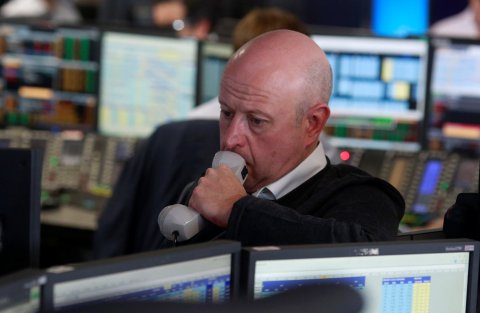
The unelected bureaucrats of Brussels have also become particular hate figures—not least because they have repeatedly ignored Europeans' democratic will. Denmark voted against both the Maastricht Treaty that sketched out monetary union in 1992 and the European Constitution in 2005; France rejected the Constitution at the same time. Irish voters refused to ratify the Lisbon Treaty, which updated the enlarged EU's institutions in 2008. The EU plowed on with its integration plans regardless.
It's possible that the EU's leaders will respond to Brexit by introducing reforms—for instance, by returning more powers over labor laws and asylum to nation-states—in a bid to stop the spread of euro-skepticism. But Brussels's initial reaction to the vote was anything but humble, suggesting to the U.K. that it hurry up and leave the European club. The presidents of the European Council, Commission and Parliament issued a joint statement calling for the U.K. to be cut loose "as soon as possible, however painful that process may be." (Many continental politicians have long found their stubborn, reluctant British counterparts unbearable.) As they tried to give Britain a shove, EU leaders at the same time tried to dissuade other countries from heading for the exit by pointing out that the U.K. is likely to suffer economically. "Britain has just cut its ties with the world's biggest market," warned European Parliament President Martin Schulz. "That'll have consequences, and I don't believe other countries will be encouraged to follow that dangerous path.… The chain reaction being celebrated everywhere now by euro-skeptics won't happen."
The political chaos could get much worse. Many Britons—especially under-24s, who voted by 75 percent to remain in the EU, compared with just 39 percent of over-65s—are pushing for a second referendum. An online petition on the U.K. government's official site gained over 3.5 million signatures in three days, meaning Parliament will have to at least consider the idea. Soon after the vote, #Bregret began trending on Twitter. Technically, the referendum result is not binding on Parliament, which must ratify a final deal to leave the EU, and an overwhelming majority of members of Parliament backed the Remain campaign.
In his resignation speech, British Prime Minister David Cameron said that it would be up to his successor—to be chosen by the ruling Conservative Party by October—to trigger the formal two-year countdown to leaving the EU outlined in Article 50 of the Lisbon Treaty. That was a significant departure from Cameron's pre-referendum position—and leaves a poisoned chalice for the next Tory party leader who will face flak for not only going ahead with Brexit but for almost certainly setting in motion a sequence of events that could lead to the breakup of the U.K. That leaves plenty of room for chickening out in the chaotic months and years ahead as the allure of Brexit fades and voters realize that it's not going to reverse either immigration or the policies of austerity Cameron's government introduced. Boris Johnson, former mayor of London and favorite to succeed Cameron, initially campaigned on the idea of having two referendums. The opposition Labour Party, currently undergoing an internal leadership battle, may also eventually unite around an anti-Brexit position.
Any new agreement with the EU is likely to look pretty much like the old one, except with the U.K. robbed of any say in European policy-making. In exchange for access to the single market, Britain will likely have to accept the principle of freedom of movement for EU citizens—just like other associated nonmember nations, such as Switzerland and Norway.
Brexit leaders talk of a civilized reordering of the U.K.'s trading and political relationships with Europe. "Our partners in the EU should know that we will remain engaged," tweeted Daniel Hannan, a member of the European Parliament who has been one of the leading intellectual lights of the Leave campaign. "Taking back control of our laws doesn't mean walking away from our allies.… The task now is to unite the country, to move in a measured and phased way to a status that both Leavers and Remainers can accept."
That's a highly optimistic view. In fact, Brexit is a symptom of powerfully disruptive political forces that are far bigger than British politics. Britain's vote was not so much about Europe as about a globalized future—a future that globalization's losers are rejecting all over the world. The next rounds of the battle promise to be far more bitter and could possibly unleash some of the darkest forces of European nationalism. Over to you, Marine le Pen. Donald Trump, you're up in November.


